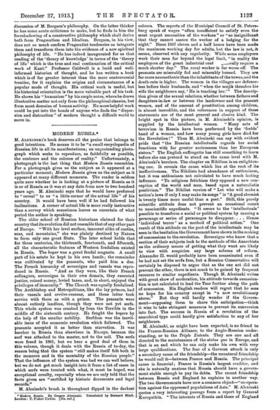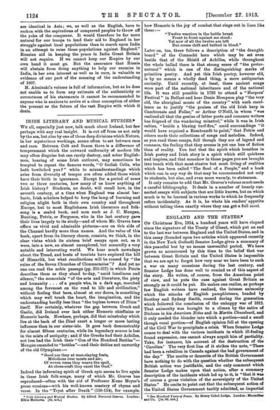MODERN RUSSIA.* M. ALEXINBRI'8 book deserves all the praise that
belongs to good intentions. He means it to be "a small encyclopaedia of Russian life in all its manifestations; an unpretending photo- graph which seeks to reproduce, as faithfully as possible, the contours and the colours of reality." Unfortunately, a photograph is the last thing that Modern Russia resembles. For a photograph gives us the subject as it appeared at a particular moment; Modern Russia gives us the subject as it appeared at many different moments. The reader is seldom quite sure whether he is looking at a picture of Russia as it is or of Russia as it was at any date from now to two hundred years ago. M. Alexinski says that he would have preferred to "reveal" to us "a little corner of the actual life" of his country. It would have been well if he had followed his inclinations. A corner of actual life is more really instructive than a survey which sometimes leaves us uncertain of what period the author is speaking.
The older school of Russian historians claimed for their country that its evolution did not resemble that of any other part of Europe. "With her level surface, innocent alike of castles, seas, and mountains," she was plainly destined by Nature to form only one great State. The later school holds that for three centuries, the thirteenth, fourteenth, and fifteenth, all the characteristic features of Western feudalism existed in Russia. The boyar was a great feudal magnate. A small part of his estate he kept in his own hands ; the remainder was cultivated by the peasants, who paid him a due. The French hierarchy of sovereigns and vassals was repro- duced in Russia. "And as they were, like their French colleagues, sovereigns in their own domain, they executed justice, coined money, levied taxes, and, in short, enjoyed the privileges of immunity." The Church was equally feudalized. The Archbishop and Metropolitans, like the lay princes, had their vassals and arriire-rassaux, and these latter took service with them as with a prince. The peasants were almost entirely landless, though they were not yet serfs. This whole system was crushed by Ivan the Terrible in the middle of the sixteenth century. He fought the boyars by the help of the smaller nobility. Serfdom was the inevit- able issue of the economic revolution which followed. The peasants accepted it as better than starvation. It was harsher in Russia than elsewhere in Europe, because the serf was attached to the master, not to the soil. The serfs were freed in 1861, but we hear a good deal of them in this volume, though it deals with the Russia of to-day, the reason being that the system "still makes itself felt both in the manners and in the mentality of the Russian people." That the influence of the system was bad we can well believe, but we do not get much insight into it from a list of cases in which serfs were treated with what, it must be hoped, was exceptional cruelty, especially when we are only told that the facts given are "certified by historic documents and legal records."
M. Alexinski's brush is throughout dipped in the darkest
• Madero Russia. By Gregor Alexinaki. Translated by Bernard Mall. London : T. F:sher Unwin. [I5s. net.]
colours. The reports of the Municipal Council of St. Peters- burg speak of wages "often insufficient to satisfy even the most urgent necessities of the workers" or "so insignificant that they cannot assure the worker of a lodging for the night." Since 1897 eleven and a half hours have been made the maximum working day for adults, but the law is not, it seems, observed with any regularity. While some employers work their men far beyond the legal limit, "in reality the
employers of the great industrial cent ,,—erally require a much shorter day." The rural worker is far worse off. The peasants are miserably fed and miserably housed. They are far more neurasthenic than the inhabitants of the towns, and the death-rate is higher. The women in the villages are defence- less before their husbands, and "when the mnjik thrashes his wife the neighbours say, He is teaching her." The descrip- tion given of the sexual relations, whether between fathers and daughters-in-law or between the landowner and the peasant women, and of the amount of prostitution among children, is almost incredible, and the references in support of these statements are of the most general and elusive kind. The bright spot in this picture, in M. Alexinski's opinion, is supplied by the intellectual women. "Many acts of terrorism in Russia have been performed by the 'feeble' hand of a woman, and how many young girls have died for the Revolution!" Thus 31. Alexinski can say with evident pride that "the Russian intellectuelle regards her social functions with far greater seriousness than her European sisters." The English suffragette has still something to learn before she can pretend to stand on the same level with 31. Alexinski's heroines. The chapter on Nihilism is an enlighten- ing one. It reveals the cause which lies at the root of its ineffectiveness. The Nihilists had abundance of enthusiasm, but it was enthusiasm not calculated to have much lasting influence. "To religious fetichism they opposed a new con- ception of the world and man, based upon a naturalistic) positivism." The Nihilist version of " Let who will make a nation's laws if only I may make its songs" is "A good chemist is twenty times more useful than a poet." Still, this purely scientific attitude does not prevent an occasional resort to unscientific expedients. "It seems to the ' intellectuals ' possible to transform a social or political system by causing a personage or series of personages to disappear. . . . Hence 'individual terror' as a method of political action." One result of this attitude on the part of the intellectuals may be seen in the hesitation the Government have shown in the making of concessions to the revolution. Sovereigns who know that a section of their subjects look to the methods of the Anarchists as the ordinary means of getting what they want are likely to view with suspicion any large scheme of reform. Alexander IL would probably have been assassinated even if he had not set the serfs free, but a Russian Conservative will certainly be disposed to argue that as the one act did not prevent the other, there is not much to be gained by frequent recourse to similar expedients. Though 1s1. Alexinski writes with great show of moderation, his attitude towards assassina- tion is not calculated to lead the Tsar further along the path of concession. His English readers will regret that he sees no hope for his country except in "a new revolutionary storm." But they will hardly wonder if the Govern- ment—supposing them to share this anticipation—think it wise to take stringent measures to prevent its conversion into fact. The success in Russia of a revolution of the anarchical type could hardly give satisfaction to any of her neighbours.
M. Alexinski, as might have been expected, is no friend to the Franco-Russian Alliance, to the Anglo-Russian under- standing, or to the Triple Entente. They are one and all directed to the maintenance of the status quo in Europe, and that is an end which he can only make his own with very large qualifications. The fear of a German attack is only a secondary cause of the friendship—the unnatural friendship he would call it—between France and Russia. The principal cause is financial ; France is Russia's largest creditor, and she is naturally anxious that Russia should have a govern- ment stable enough to pay its debts. The recent friendship between Russia and England he explains in another way. The two Governments have now a common object—" co-opera- tion against the oppressed populations of Asia." M. Alexinski quotes a very interesting passage from a report by General Kuropatkin. "The interests of Russia and those of England are identical in Asia ; we, as well as the English, have to reckon with the aspirations of conquered peoples to throw off the yoke of the conqueror. It would therefore be far more natural for our troops to lend their aid to England in her struggle against local populations than to march upon India in an attempt to raise these populations against England." Russian aid in keeping the peace in India Great Britain will not require. If we cannot keep our Empire by our own hand it must go. But the assurance that Russia will abstain from doing anything to help our enemies in India, in her own interest as well as in ours, is valuable as evidence of one part of the meaning of the understanding of 1907.
H. Alexinski's volume is full of information, but as he does not enable us to form any estimate of the authenticity or correctness of his statements it cannot be recommended to anyone who is anxious to arrive at a clear conception of either the present or the future of the vast Empire with which it deals.



































 Previous page
Previous page